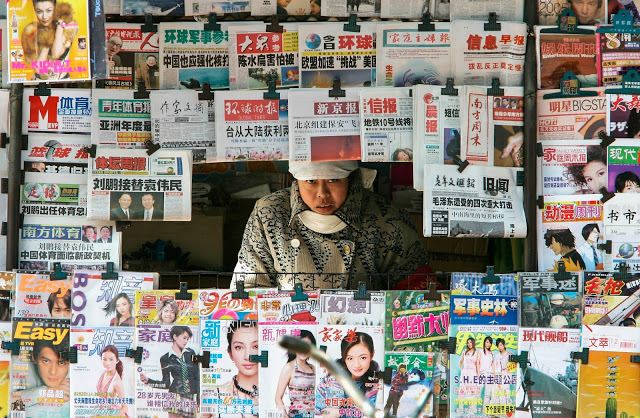
Iran and North Korea: Partners in Proliferation?
July 29, 2015
Extending Domestic Governance Over the Seas: China’s State Oceanic Administration
August 6, 2015By Sabrina Tsai |
On May 29, 2015, Chinese Ambassador to the U.S. Cui Tiankai warned that U.S. alliances in Asia are being perceived as “anti-China.” Positing that some in China do not see territorial disputes in the region as sufficient reason for military alliances, he warned that it is detrimental to U.S. interests that Chinese citizens perceive the U.S. as against them. A rhetorical warning such as this one from Chinese officials point to the bigger questions of how China views U.S. alliances in the region and, more importantly, what China is doing to influence these alliances through political operations.
Chinese Political Warfare
Aside from Chinese intransigence on recognizing its adversarial activities as hostile in the regional security environment — such as land reclamation in the South China Sea and the arms buildup across the Taiwan Strait — it consistently engages in psychological warfare to shape the way world events are viewed both at home and abroad. A favorite target of the Chinese state-run media is the U.S.-Japan alliance. In 2015, the seventieth anniversary of the end of the Second World War, China has ramped up its media and information campaigns to undermine the health and progress made between Japan and its partners since 1945. The Chinese Communist Party’s (CCP) concerted efforts to commemorate the end of the “world anti-fascist war” intentionally emphasize Japan’s wartime legacy instead of regional advancements. In a world of power politics, soft power and hard power maneuvers are conjoined to create a desired political outcome. In the case of China, this is not amiss.
While psychological-political components are inherent in every diplomatic, economic, and military instrument of national power,[1] China employs a peacetime information campaign that  target individuals’ unconscious framework for viewing the world, including its own citizens. Referred to by some as the “Three Warfares,” which includes media warfare, psychological warfare, and legal warfare, Chinese political warfare encompasses a large umbrella of networked state actorswho drive the creation and transmission of information to targeted audiences. Media warfare is an extended tradition of the CCP and a powerful political tool designed to sway the audience toward a state-sanctioned national narrative. Ranked 176 out of 180 by a French-based watchdog group Reporters Without Borders, China’s press freedom is among the worst in the world and is highly controlled by the state for political ends.
Targeting the U.S.-Japan Alliance
Certain thematic trends can be found in the Chinese media in framing events related to the U.S.-Japan alliance. Chinese reporting follows specific themes in order to influence and manage the perceptions of domestic audiences. They utilize the following thematic perception management tactics:
Highlighting regional expert commentators whose views are favorable to the CCP. In critiquing the U.S.-Japan alliance, Chinese media often uses opinions of experts or reporters from Japan and the region whose views align with their own. For example, Chinese reports have highlighted Australian expert Hugh White’s criticisms on Japan’s efforts to reform security policies, further stating that if Japan was to go to war with China, it would not have a decisive victory since it is uncertain whether the U.S. would actually follow through on its defense commitments to Japan during wartime.
Utilizing opposing voices in Japan’s democratic society to its own political advantage. Japan’s democratic society is backed by mature political institutions and civil society. With the freedom of expression, Japan’s populace with opposing views have the latitude and platform they need in order to make their political opinions heard. Chinese media often capitalizes on views found within the pluralist society that favor its political positions. In analyzing Prime Minister Abe’s motives for his policies, Chinese media highlights Japan’s domestic opposition to legitimize its allegations of PM Abe’s intentions as devious at its core.
Controlling how international events related to Chinese interests are covered. Chinese media regularly covers international events that relate to its national interests in a way that presents its side as just to the domestic Chinese audience. For example, a statement of concern released by G-7 summit conveners regarding heightened tensions in the South China Sea was covered by the Chinese media as a “Japanese effort” to “defame” China through a multilateral forum. Tactics like this one is commonly used to shape perceptions within China as a part of its overall psychological warfare. In order to win future wars, CCP leaders know that it would have to mobilize the populace, and peacetime information dissemination helps to ready the mentality of the nation against a specific, common enemy.
In addition to a relentless overhaul of reports criticizing PM Abe through attacks on his character, the CCP has also mobilized ad-hominem attacks against U.S. Pacific Command (USPACOM) Combatant Commander Admiral Harry Harris for his Japanese heritage. Chinese reporting of U.S. military statements and surveillance of China’s land reclamation activities in the South China Sea have pinpointed Admiral Harris’ Japanese ethnicity as the driving impetus for “hawkish” policies against Chinese escalations. USPACOM cooperation with Japanese forces have been covered in a way that implies that Admiral Harris has a personal vendetta against the Chinese military simply because of his heritage. Such racist ad-hominem attacks on key U.S. leaders reveal the CCP’s political interests in managing domestic perceptions through psychological warfare.
While these four perception management tactics are not comprehensive, they cover basic trends utilized by state-controlled Chinese media outlets as a part of its psychological-political warfare against the U.S.-Japan alliance among its domestic audience. These tactics, some more blatantly inappropriate than others (e.g., racism), are unlikely to abate in the near future. The U.S. would be wise to monitor Chinese political warfare tactics more closely in order to strengthen its understanding and preparedness against unwanted political operations aimed at weakening its alliance partnerships.
[1] Fred Ikle, “The Modern Context,” in Political Warfare and Psychological Operations, ed. by Frank Barnett and Carnes Lord. (National Defense University Press, 1989), pg. 20, at http://www.dresmara.ro/resources/carti/PWPOR.pdf




